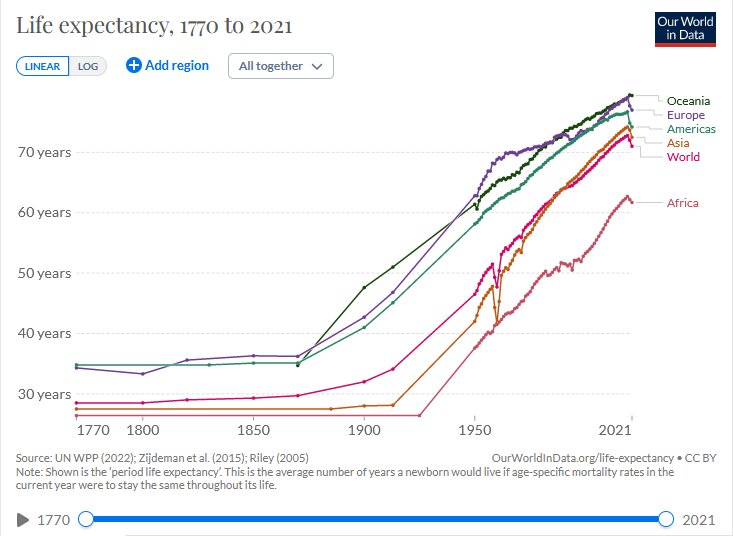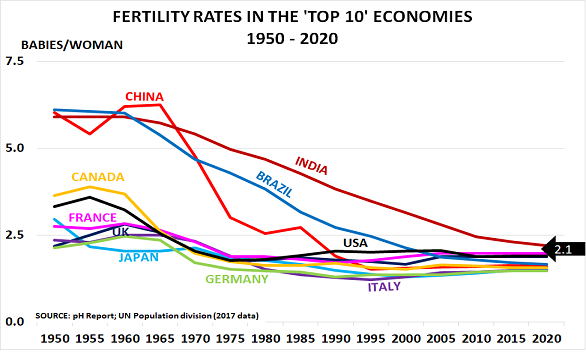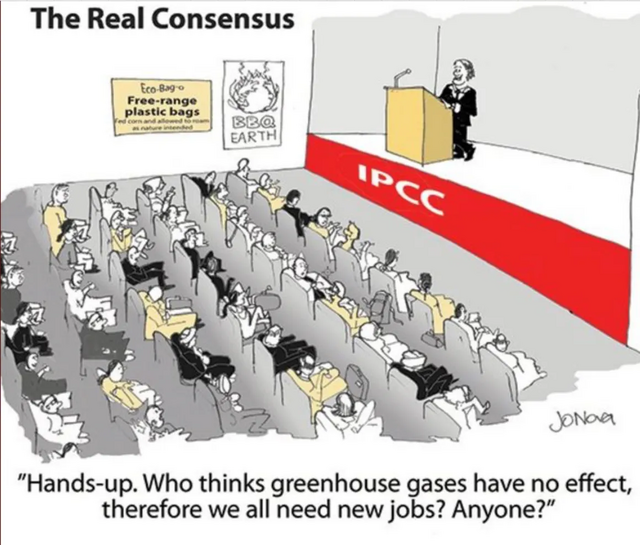Many months ago I wrote about America's great natural abundance and I said "Don't Panic".
neoterra.us/blog/dont-panic
But that is only a small part of the story. In the last post I wrote about how astoundingly productive our agricultural sector is... even if China does overtake our GDP, it will be a hollow victory because they need 15x as many people toiling in the fields just to feed themselves.
neoterra.us/blog/dont-panic-unrivaled-part-1
Living Longer
Today, I'd like to talk about the demographics of aging. It is NOT pretty for us, but it is a disaster for China.
First, let us look at the advent of industrialization. The Industrial Age began in the 1700's with the invention of the steam engine and a transition from wood to coal as fuel.
www.history.com/topics/industrial-revolution/industrial-revolution
We see almost no increase in life expectancy for the first 150 years... a period when the British Empire was the world's greatest industrial economy. Life expectancy in Europe and America hovered around 35 years.
Coincidentally, life expectancy began increasing at about the same time that America became the greatest economy in the world (around 1875-1880)

Life expectancy in industrialized countries increased dramatically from 1900 to the present. During this period people worked 15-20 years longer because they lived so much longer. The productive population in industrialized countries doubled.
As late as 1950, the average life expectancy in industrialized countries was still less than 60 years (even less in the rest of the world). The population of productive, working age people was still expanding because people were living longer and working longer.
Education
During the age of aristocrats and serfs, the common people did not need and could not afford the time for an education. They worked from childhood until they died (at age 30).
The aristocracy, of course, generally lived longer because they wore frilly outfits, they were well fed and had access to the finest leeches and bleedings (systemic classism in health care). This afforded them the years to attend Cambridge and sit under apple trees.
As the adult life span increased, common people could invest more years in education. This unleashed accelerating creativity and technology (and we eventually rejected leeches and embraced Fauchi Ouchies).
Declining Fertility
One of the side effects of industrialization, and increased longevity is declining fertility. Simply put, women in prosperous countries tend to have fewer children. (I have some irreverent thoughts on this but I shall keep them to myself).
To have a stable population each woman (on average) must have 2.1 children. One to replace herself and one to replace a man (because men can't get pregnant, dammit!). The extra .1 covers infant mortality.
Most industrialized countries are now below replacement and their populations will start to decline.
- Japan's population has been declining for a few years and China's population declined for the first time last year.
Declining population isn't necessarily a bad thing in a crowded world... however, a nation with fewer and fewer productive, working-age people will have enormous challenges supporting it's elderly 'bubble'.
As the following graph illustrates, the United States went through a population boom in the 1950's which fueled an economic resurgence 30 years later in the 80's (Reagan helped).
China's fertility decline (partly due to the one-child policy) has been absolutely stunning. China's fertility rate is now lower than the United States and among the lowest on planet Terra. (As an aside, the population of India has recently surpassed China. The only countries where populations are still exploding are in Africa).
It appears that the economic boost from greater life expectancy only lasts one or two generations. Declining fertility eventually takes over and leads to a stable or shrinking population. Japan, South Korea and Italy are the canaries in the coal mine.
During the transition, there are fewer and fewer working-age people to support the expanding number of elderly. This is occurring with the Boomer generation in the United States right now (YAY ME). Social Security is in trouble.
Automation and improved productivity can partially compensate for the shrinking workforce, but such solutions will probably not be quick enough... particularly when the Democrats are obsessed with crippling our energy supplies and destroying the economy.
Eventually the situation will stabilize as the Boomers die off. BUT I intend to hang around for many more years.
I know this sounds dire but the situation for our rivals (like China) is much worse. China now has the most rapidly aging population in the world and will face the 'retirement explosion' in another ten to fifteen years. Their problems will be MUCH worse than ours. The 'experts' who predict that China will soon surpass America are not looking at the demographic reality.
www.businessinsider.com/china-shrinking-population-worker-labor-shortage-grim-omen-global-economy-2023-2?op=1
A Shortage of Women
The problem in China is exacerbated by the shortage of women... created by the one-child policy (socialists always fuck things up). It is estimated that China is lacking 30 Million young women which has led to a massive surge in sex trafficking (perhaps that's why the Democrats love open borders... sales of young women to China are booming).
Agriculture
Recall that China needs about 25% of it's current workforce just to feed itself while the United States needs less than 1%. It is highly unlikely that China can automate its agricultural sector fast enough to compensate for a declining workforce. The elderly will stop working but they will keep on eating.
Immigration
The United States is a nation of immigrants. Our population will continue to increase over the next 30 years while the rest of the industrialized world is in decline. US immigration will help ease the Boomer Burden.
Our friendly Maple Syrup neighbors in Canada are on a similar trajectory. Canada is one of the few industrial nations that will continue to grow over the next 30 years. Canada has vast natural resources and can accommodate millions of immigrants.
China, on the other hand, has one of the lowest rates of immigration in the world. NO ONE wants to move to China!
Conclusion
Our current social and economic landscape in the United States seems dismal. However, I remain optimistic for the nation's future. The United States still has advantages that make it unrivaled.
- The greatest economy in the world
- The most advanced and powerful military in the world
- Abundant farms and forest
- The most highly productive agriculture in the world (less than 1% of our population produces all the food we need).
- Abundant resources and vast reserves of fossil fuel (if the Democrats would just stop f***ing things up).
- AND... Very Important... the most intelligent and beautiful women on the planet.
In the next post I'd like to talk about some of America's other advantages.
We have many social and economic challenges ahead... challenges that may last for many years... challenges that may last longer than the time I, personally, have left. That's OK.
I am reminded that JFK once said "The rising tide lifts all the boats". Well, the opposite is also true... the falling tide (of current world events) will leave most of our adversaries grounded on a sand bar.
It seems to me that only the United States is in a position to prevail. More in the next post.
IN THE MEANTIME.... DO NOT PANIC









































 RSS Feed
RSS Feed